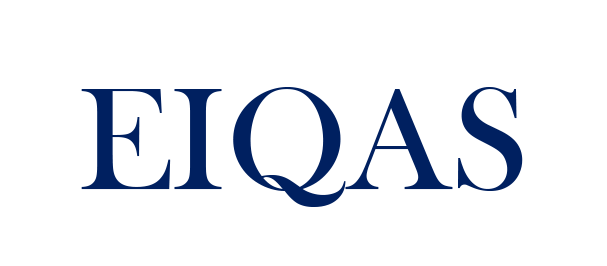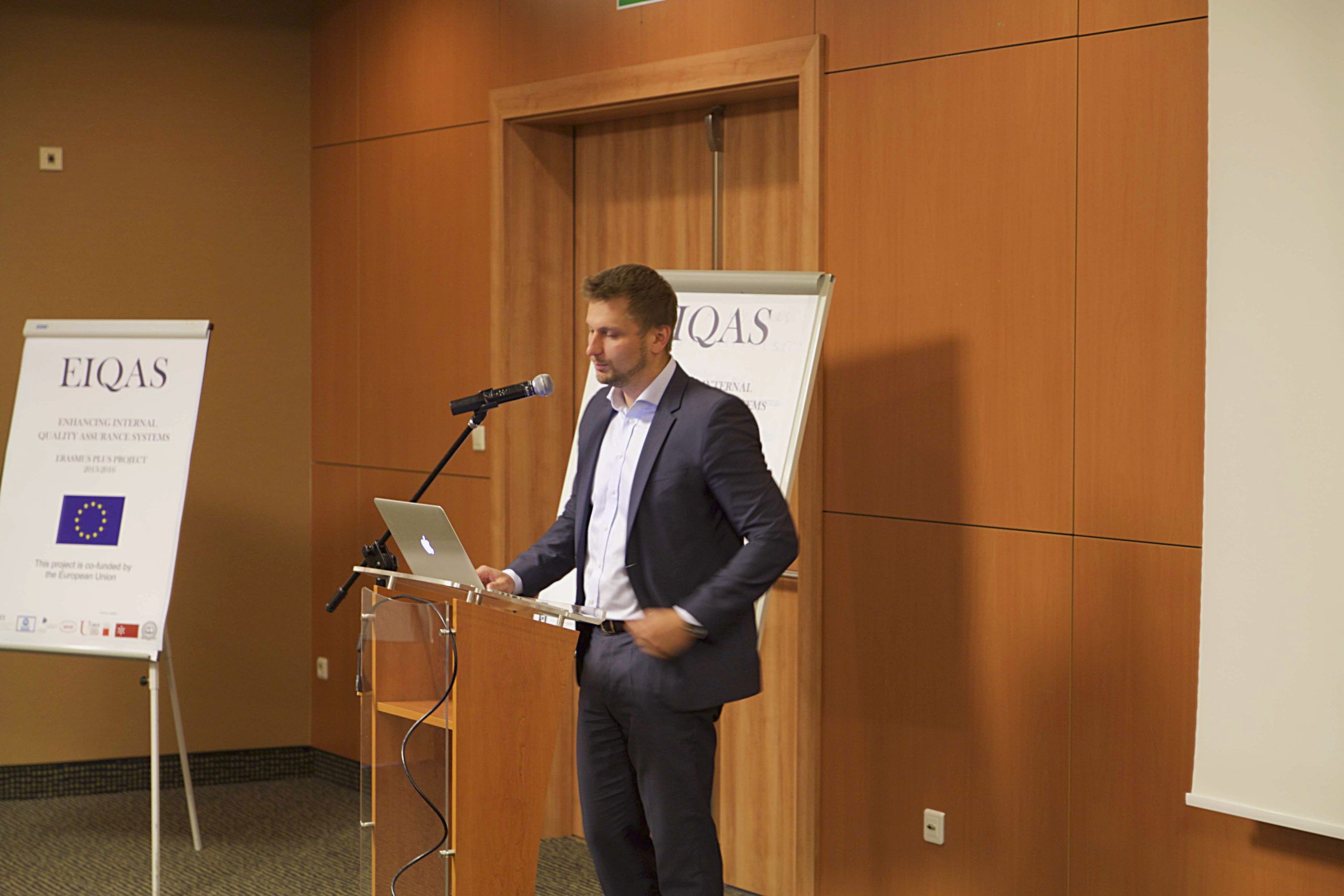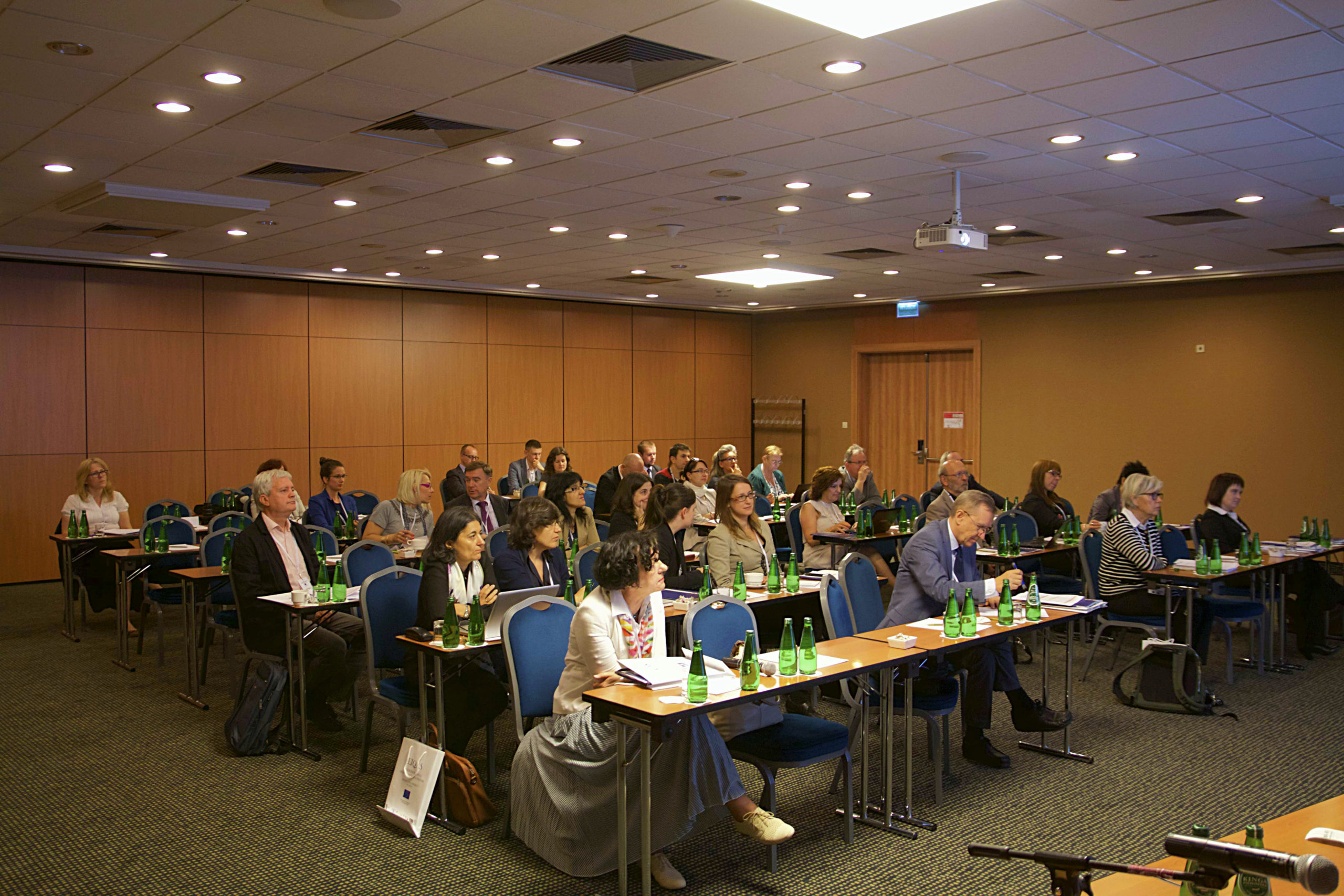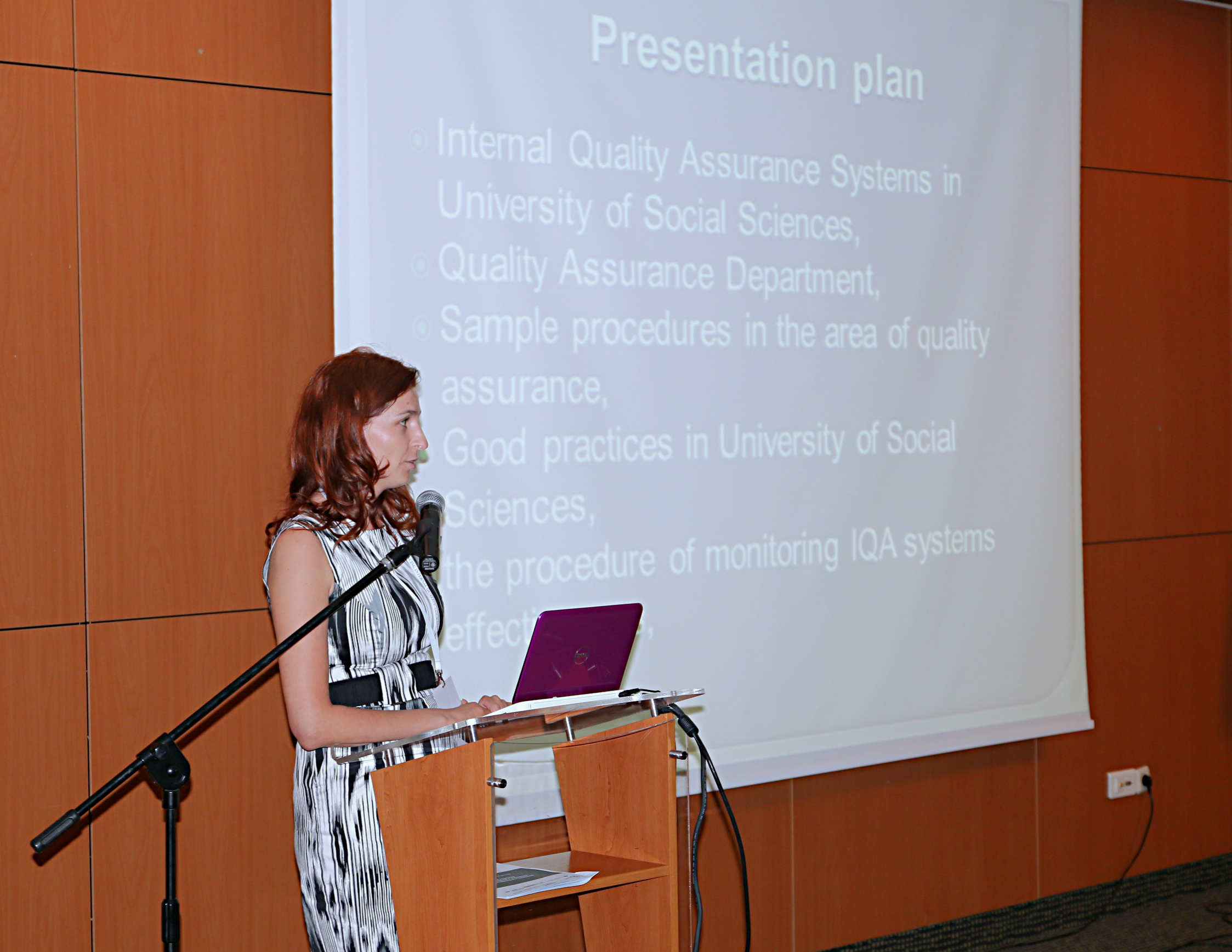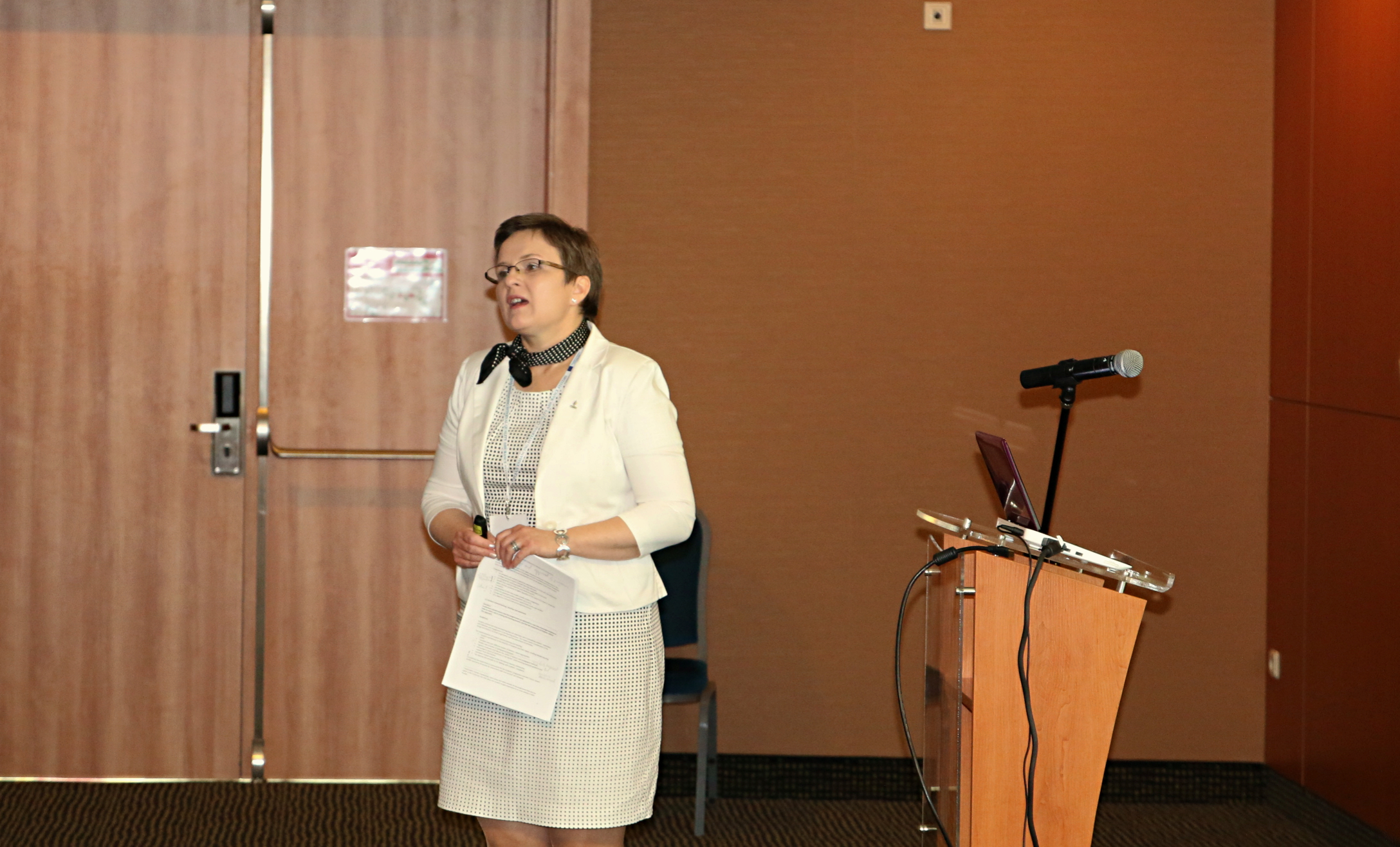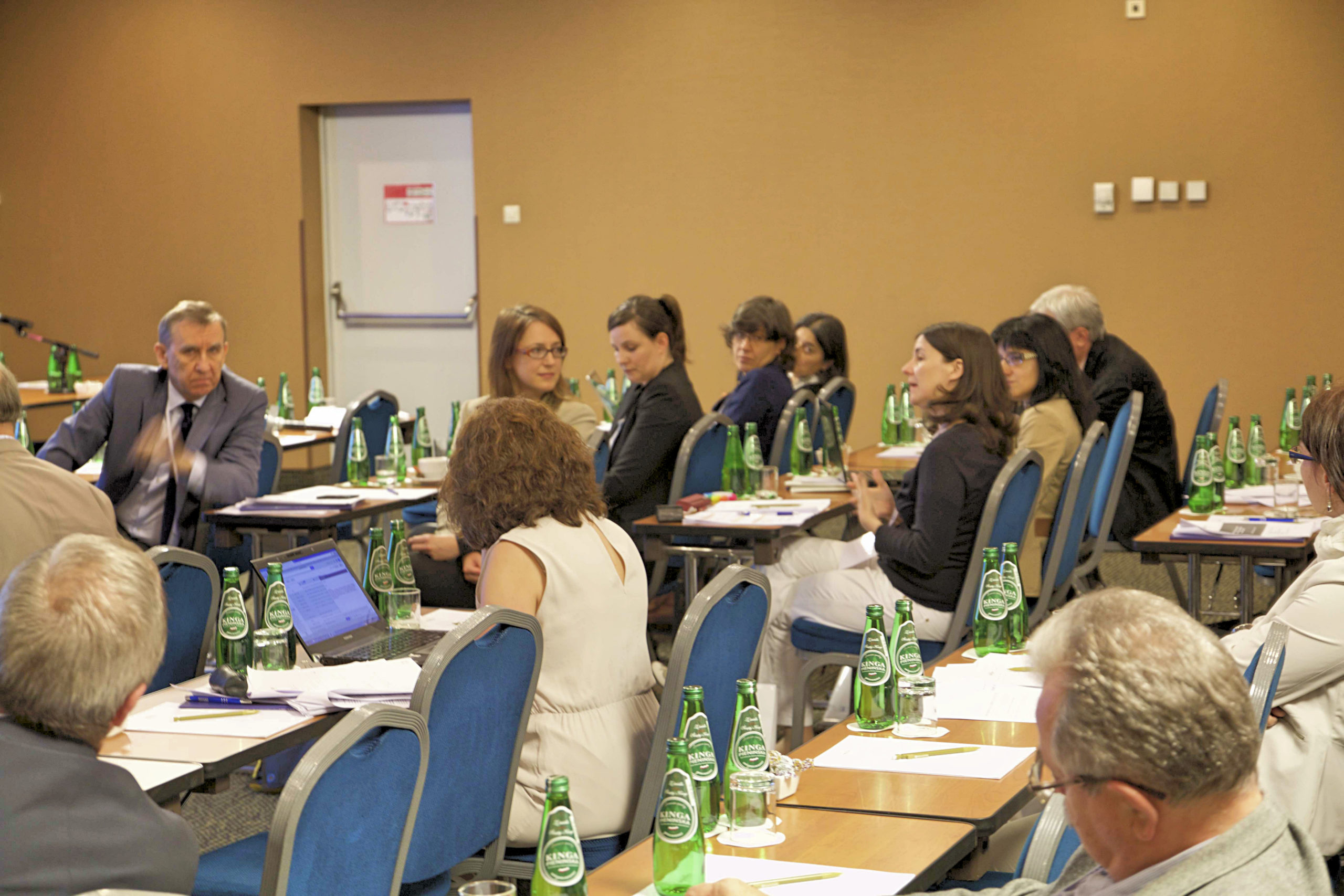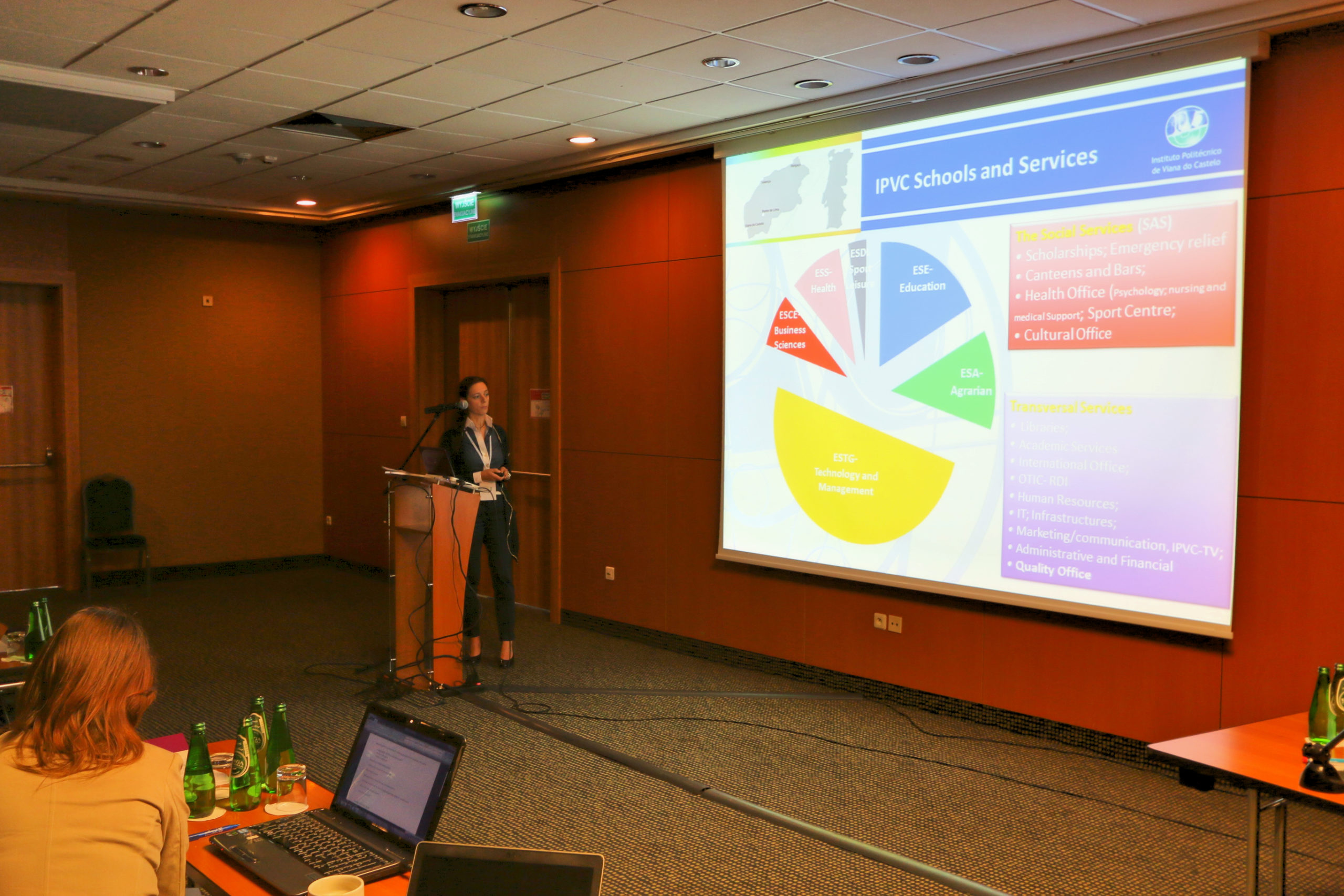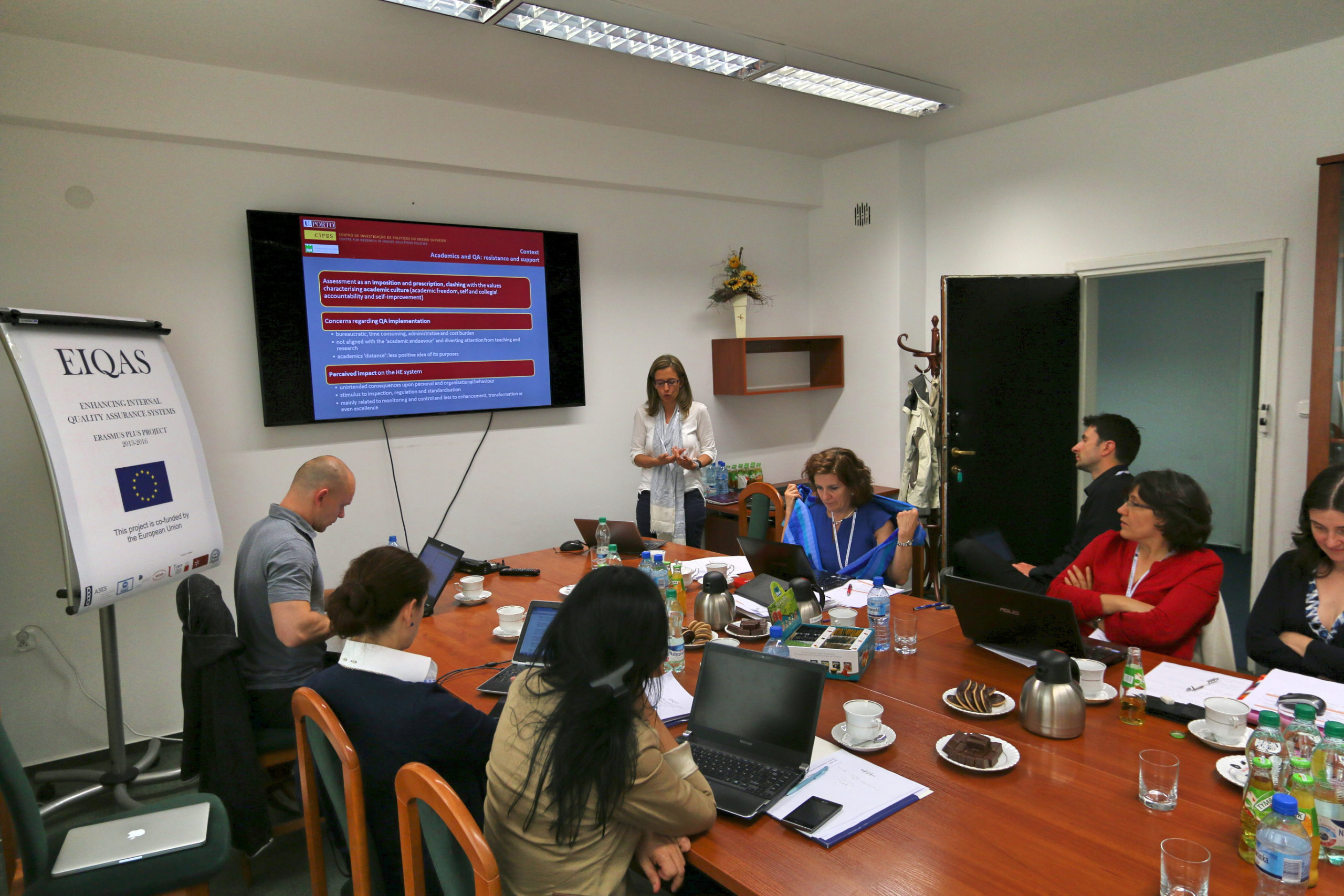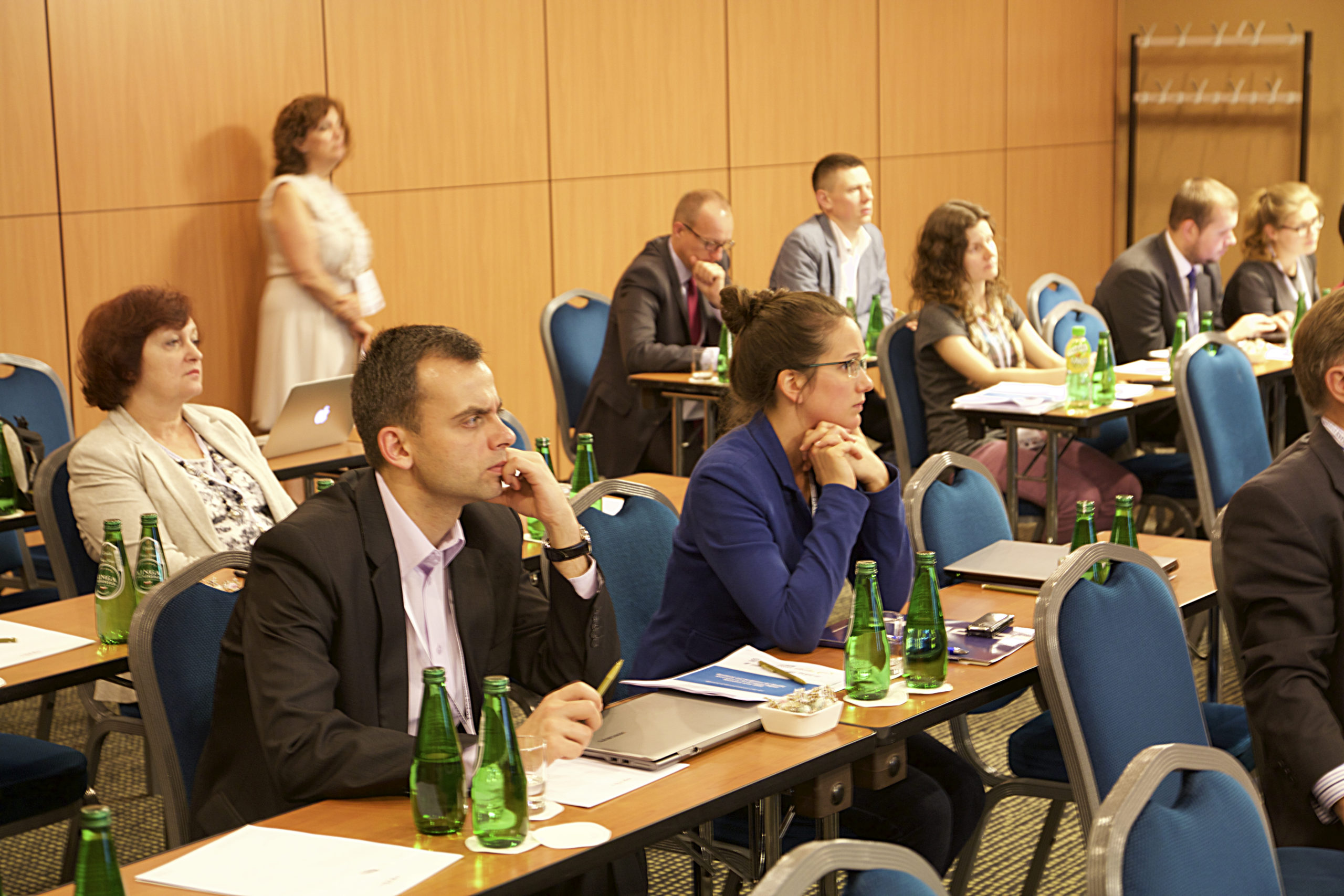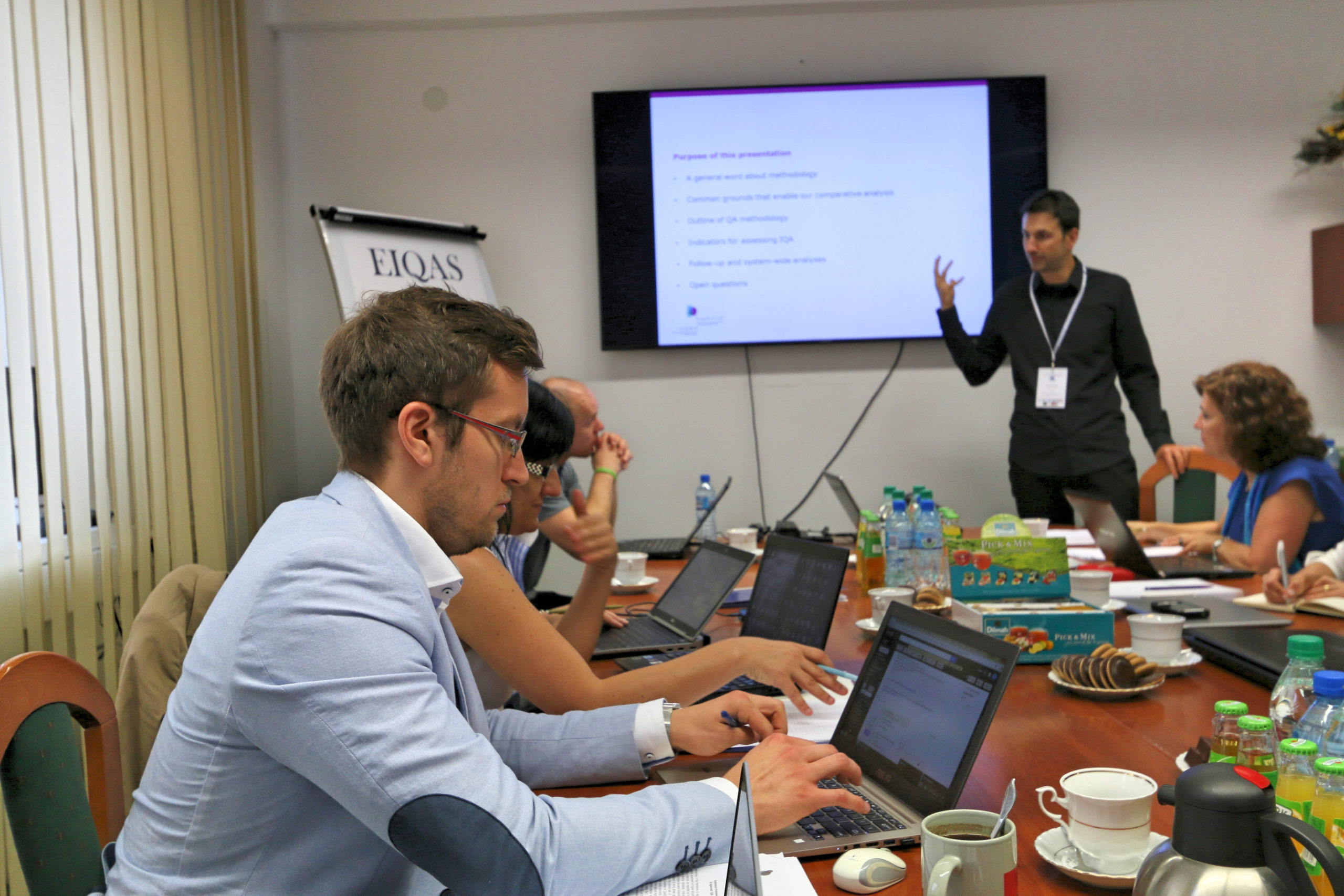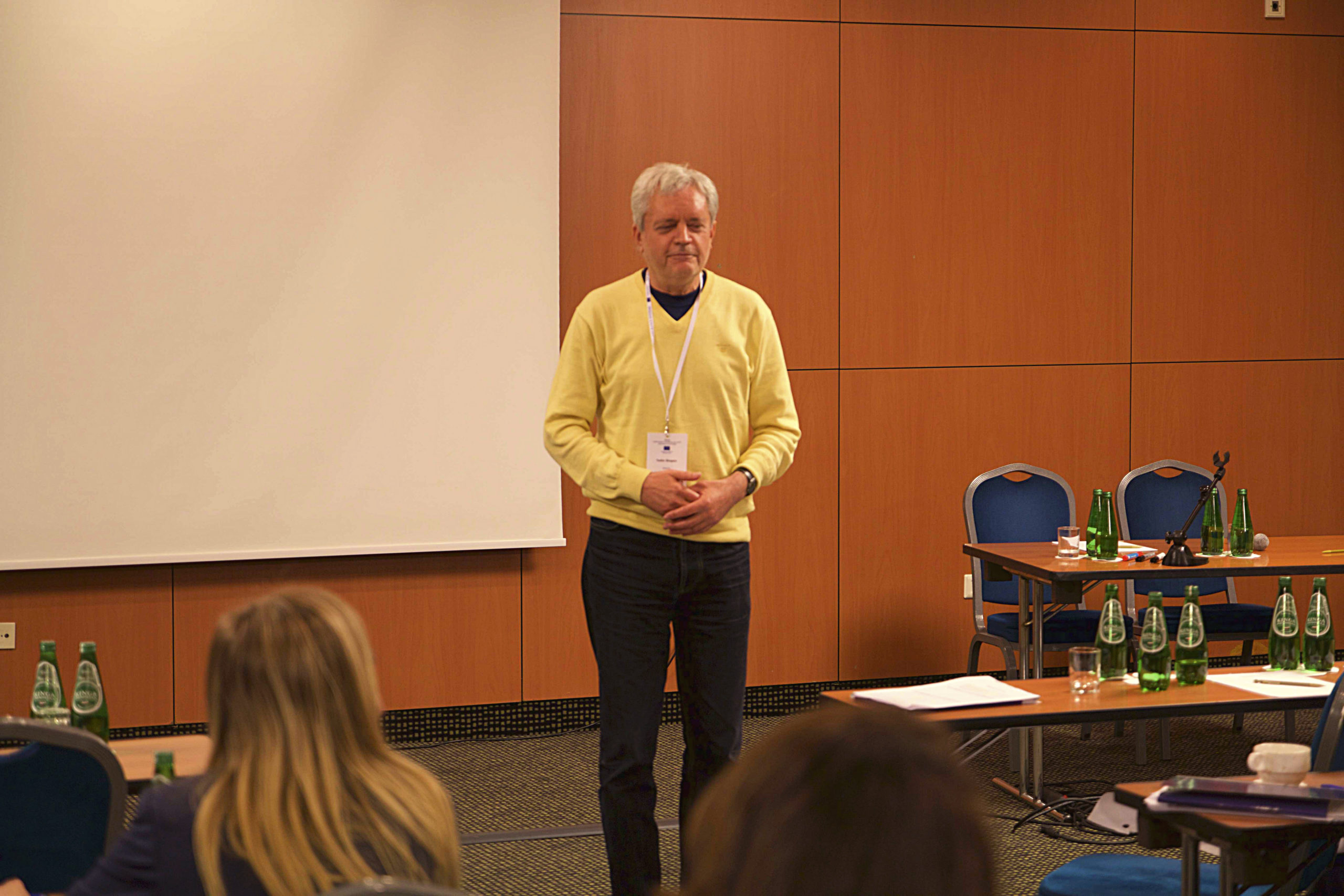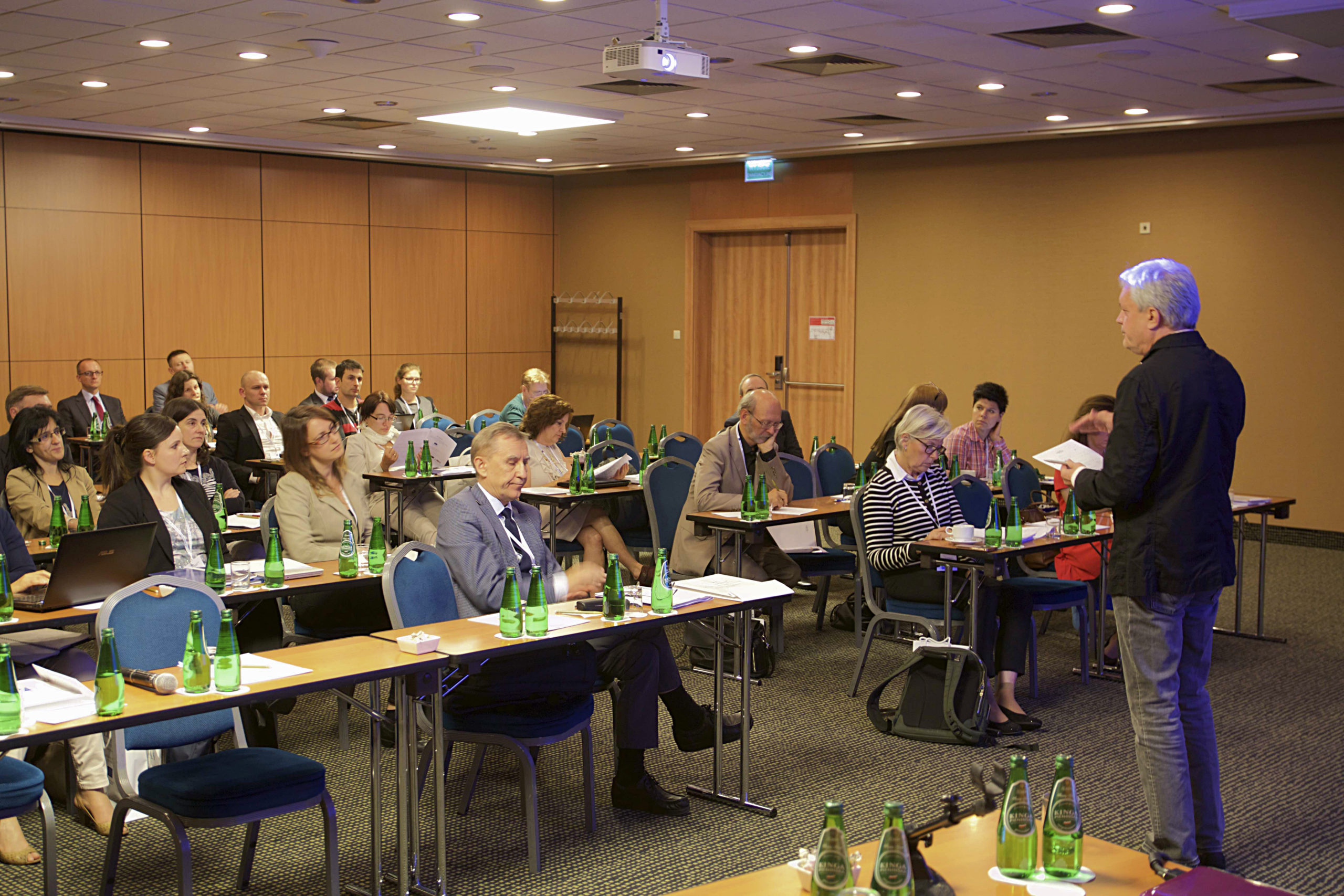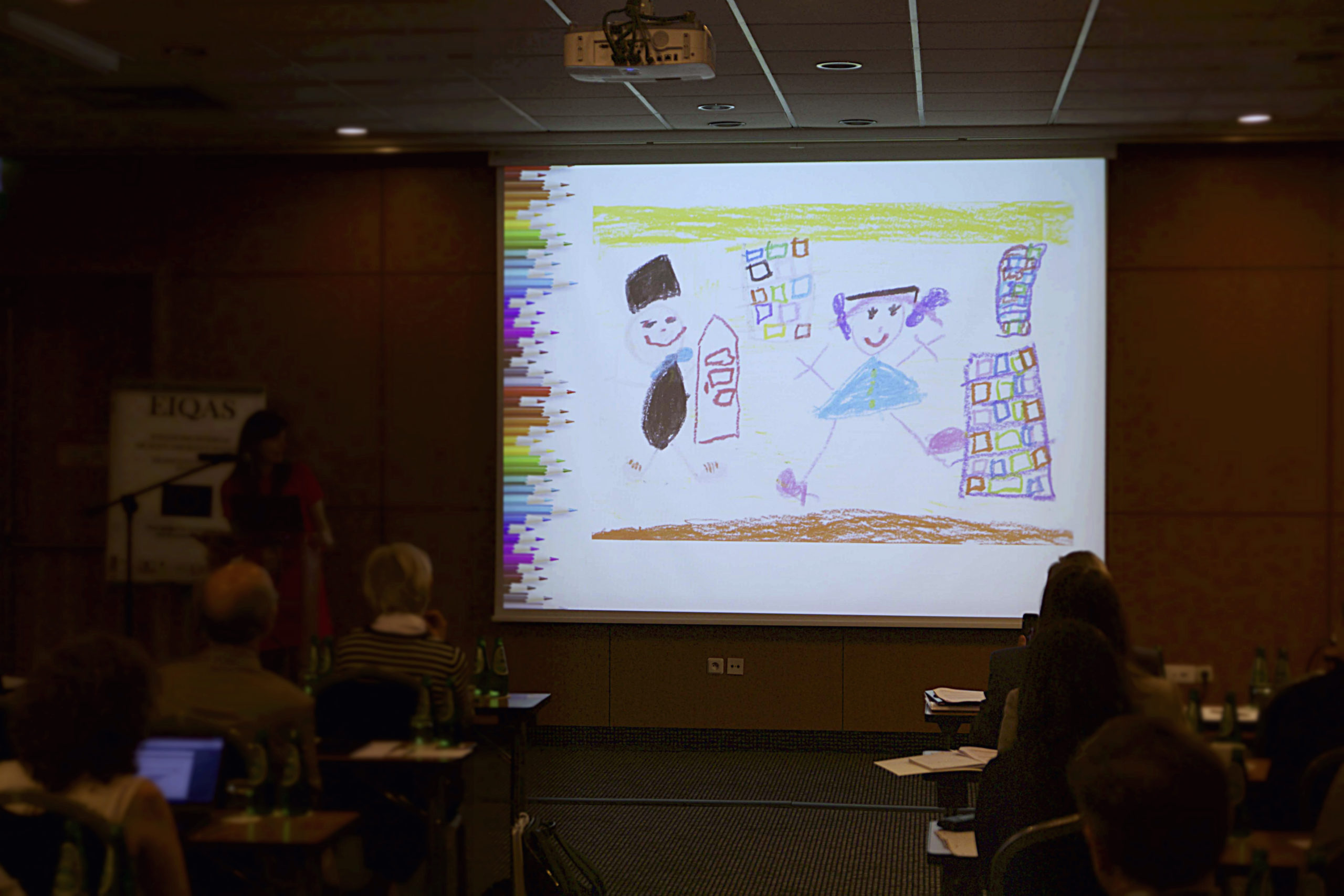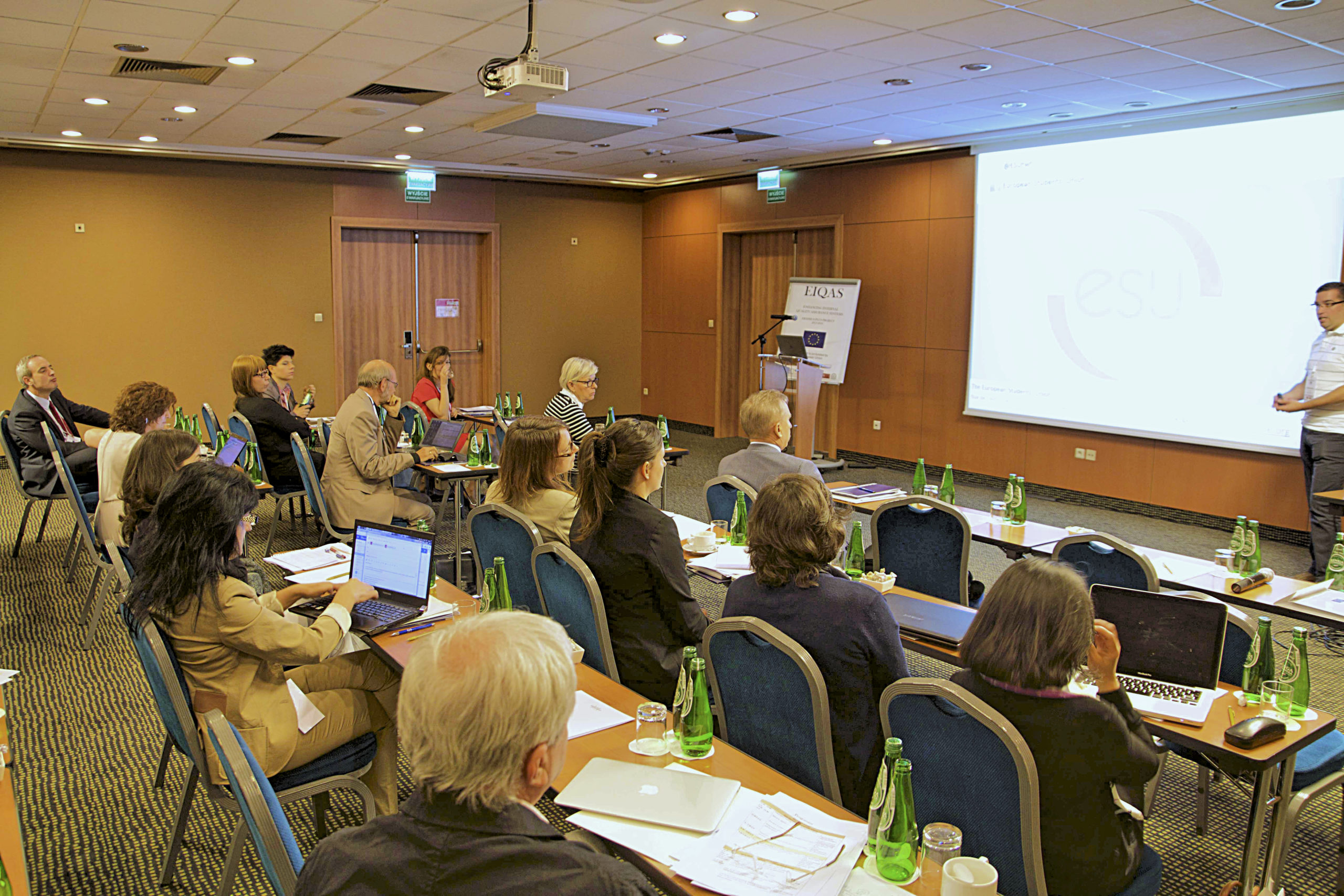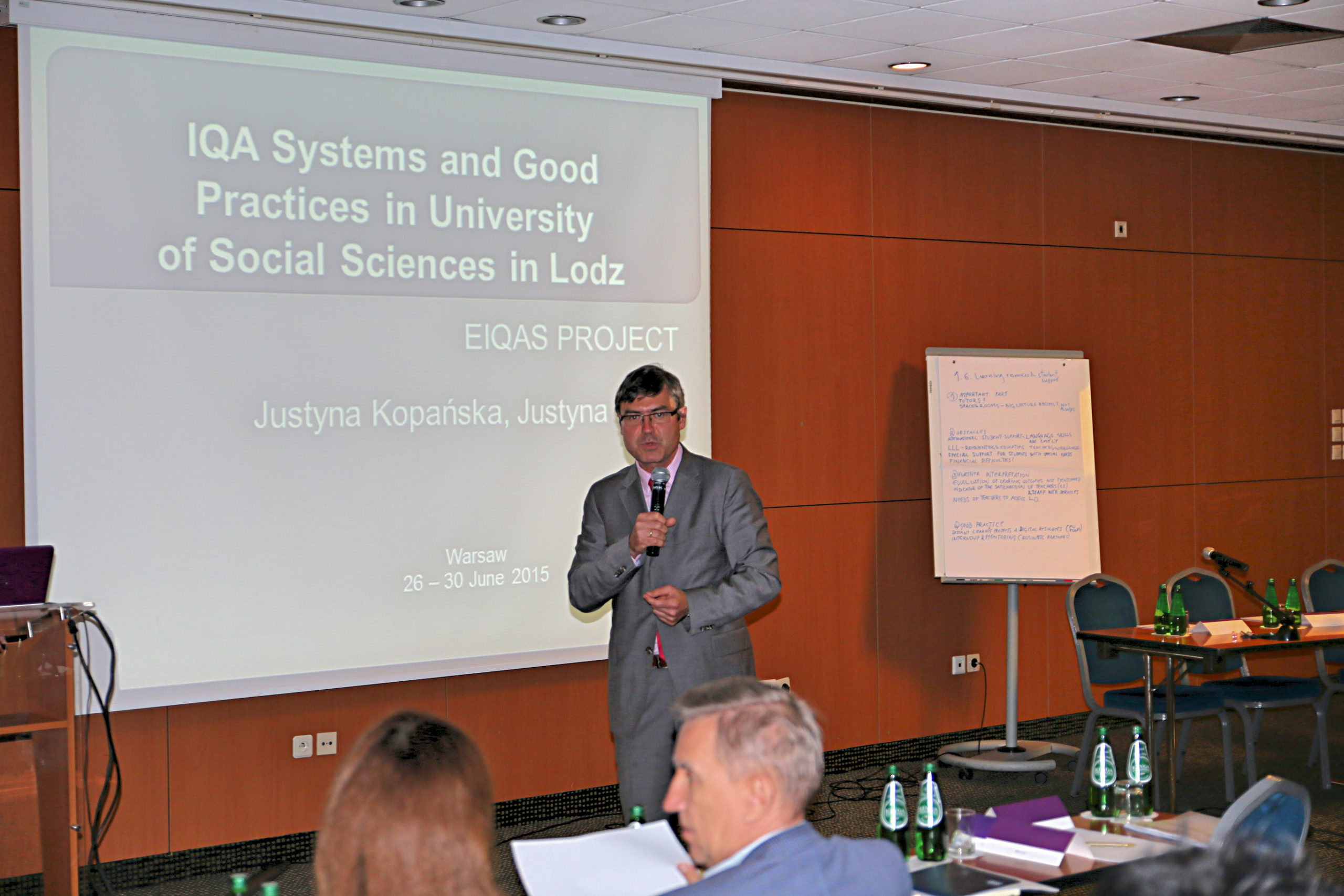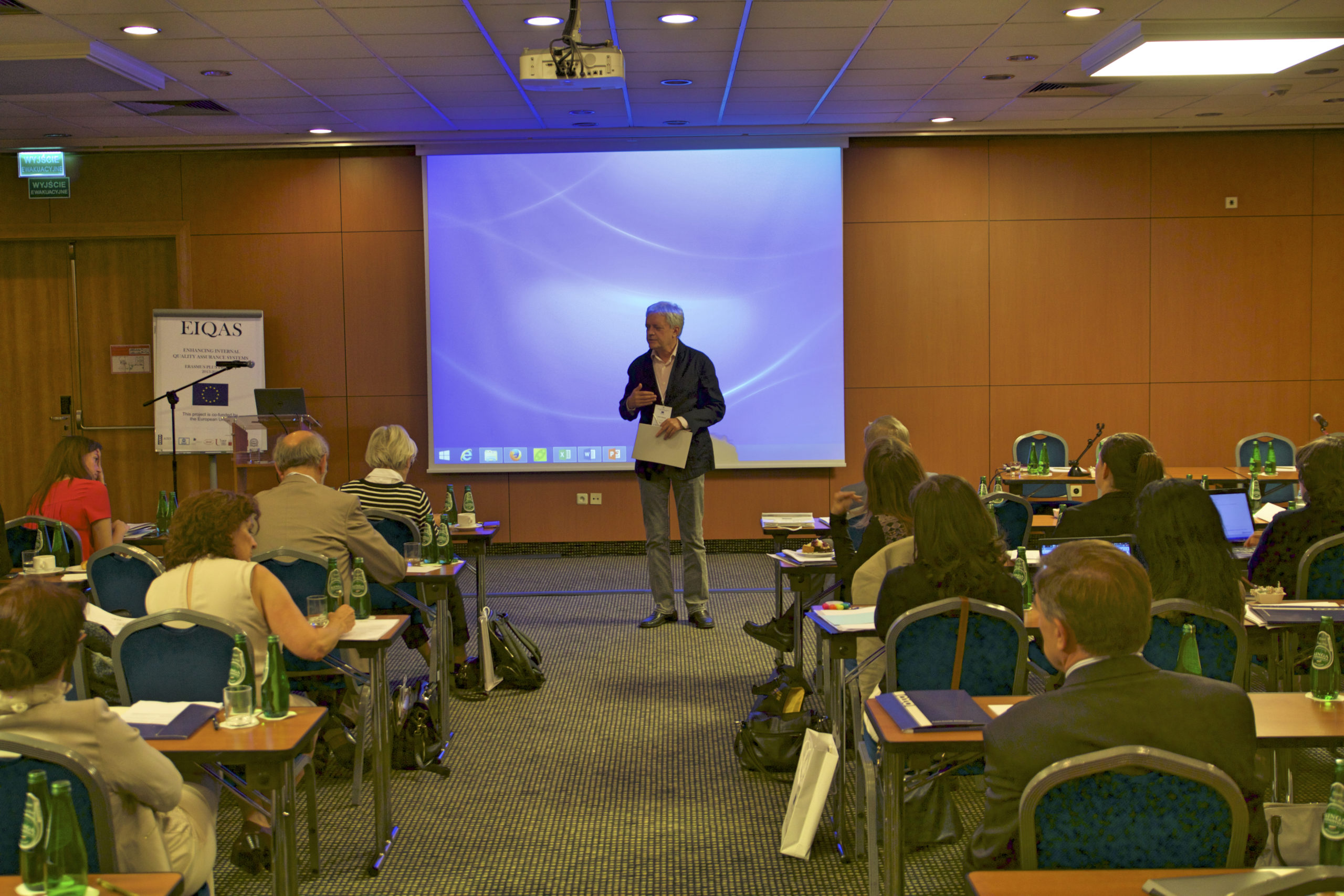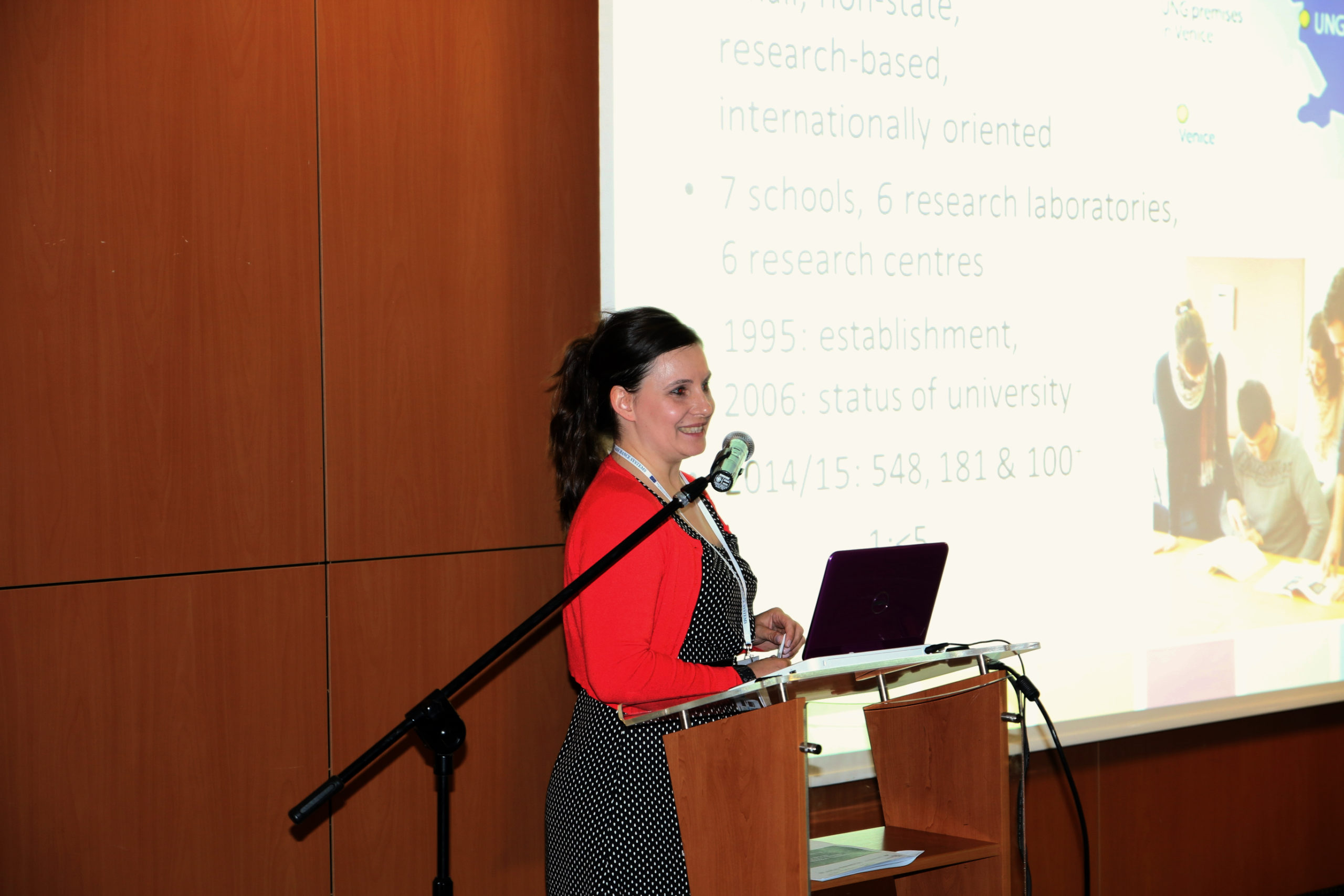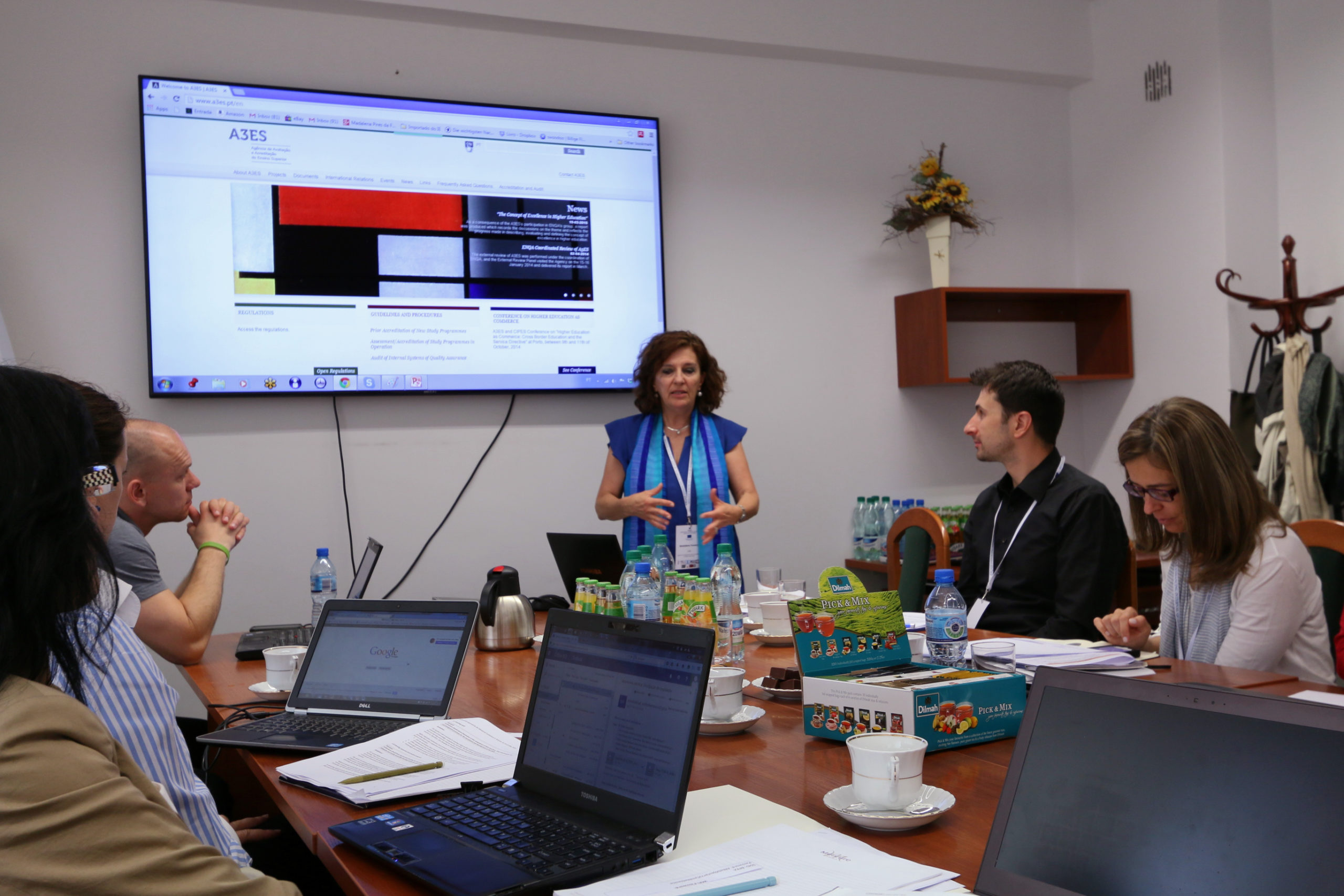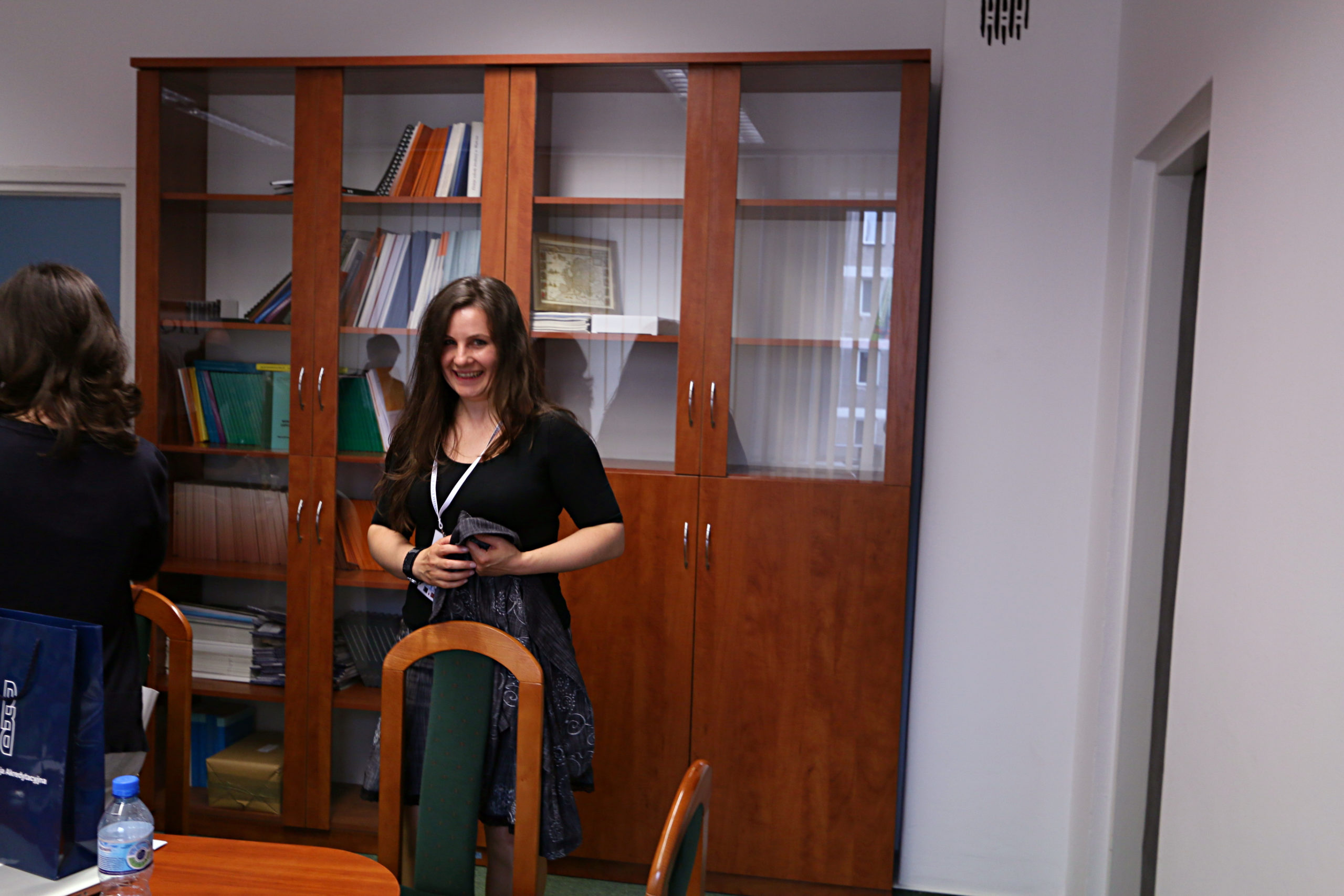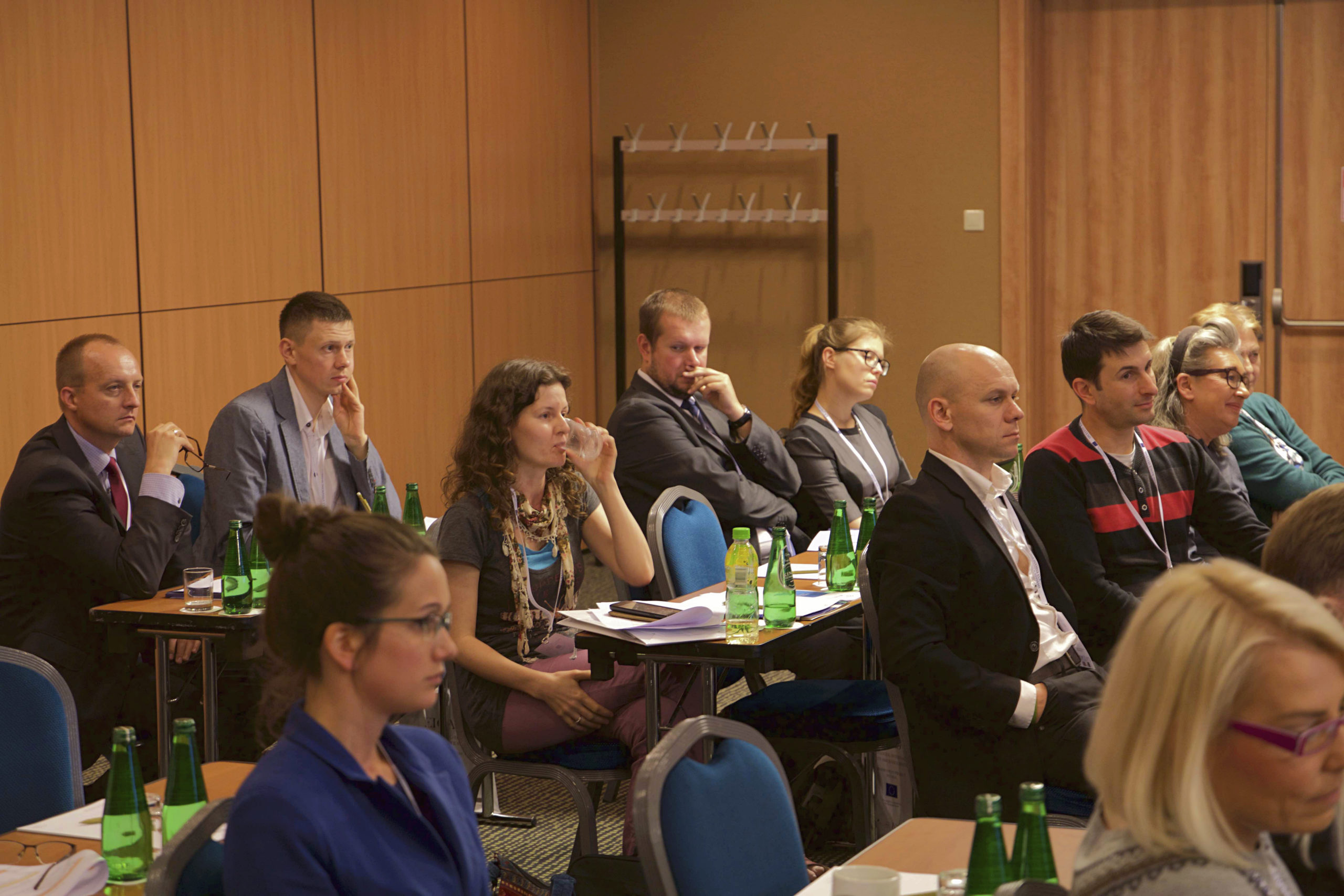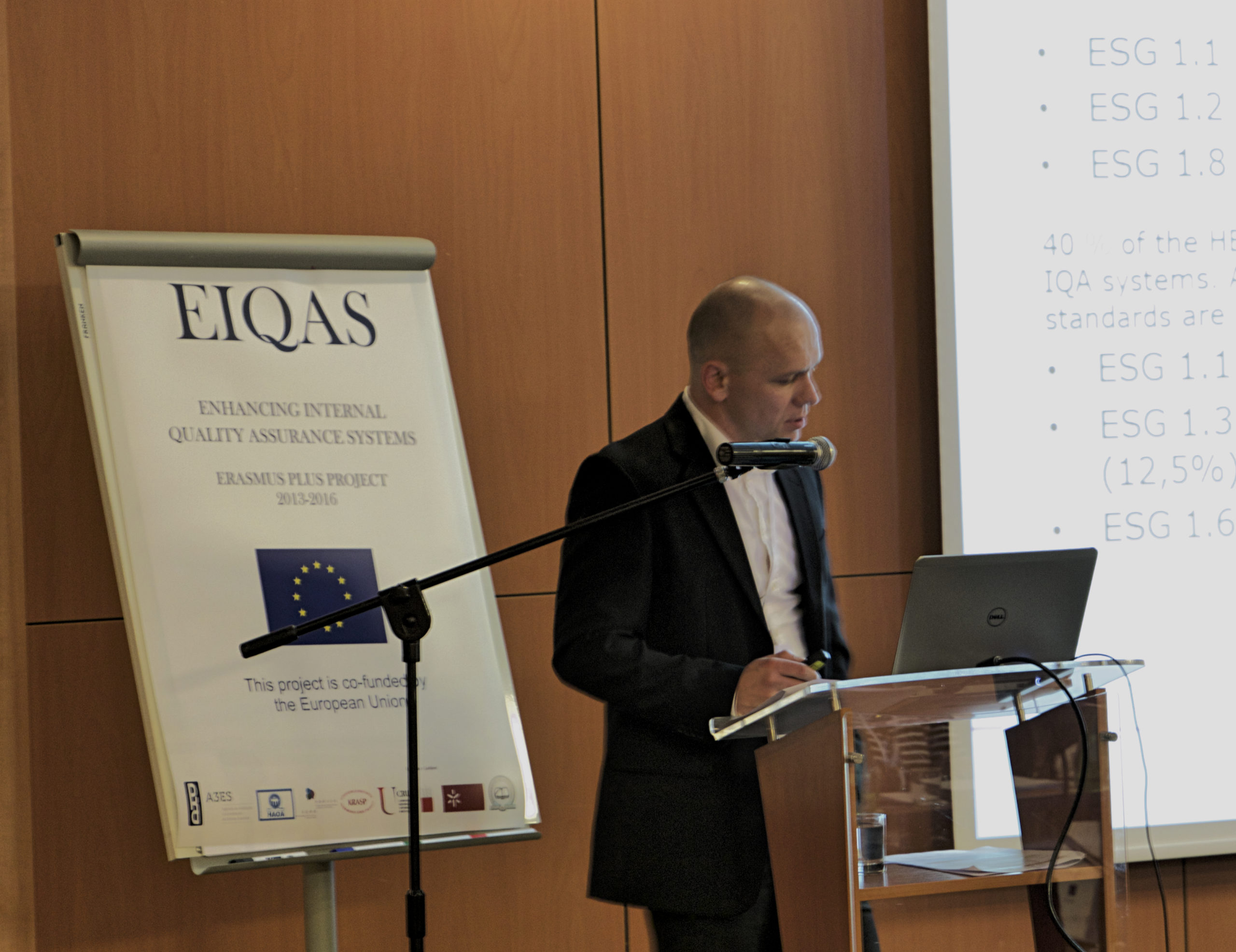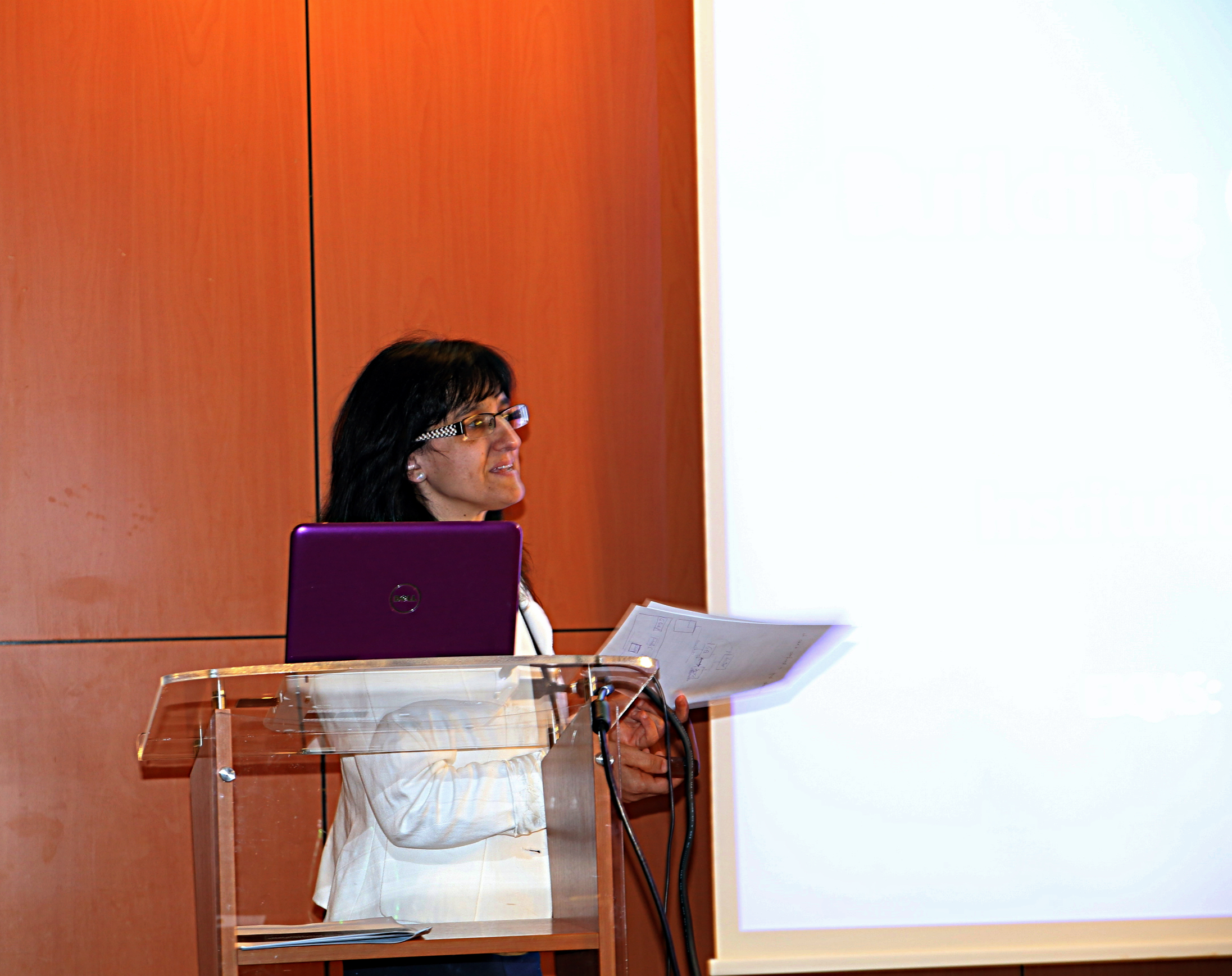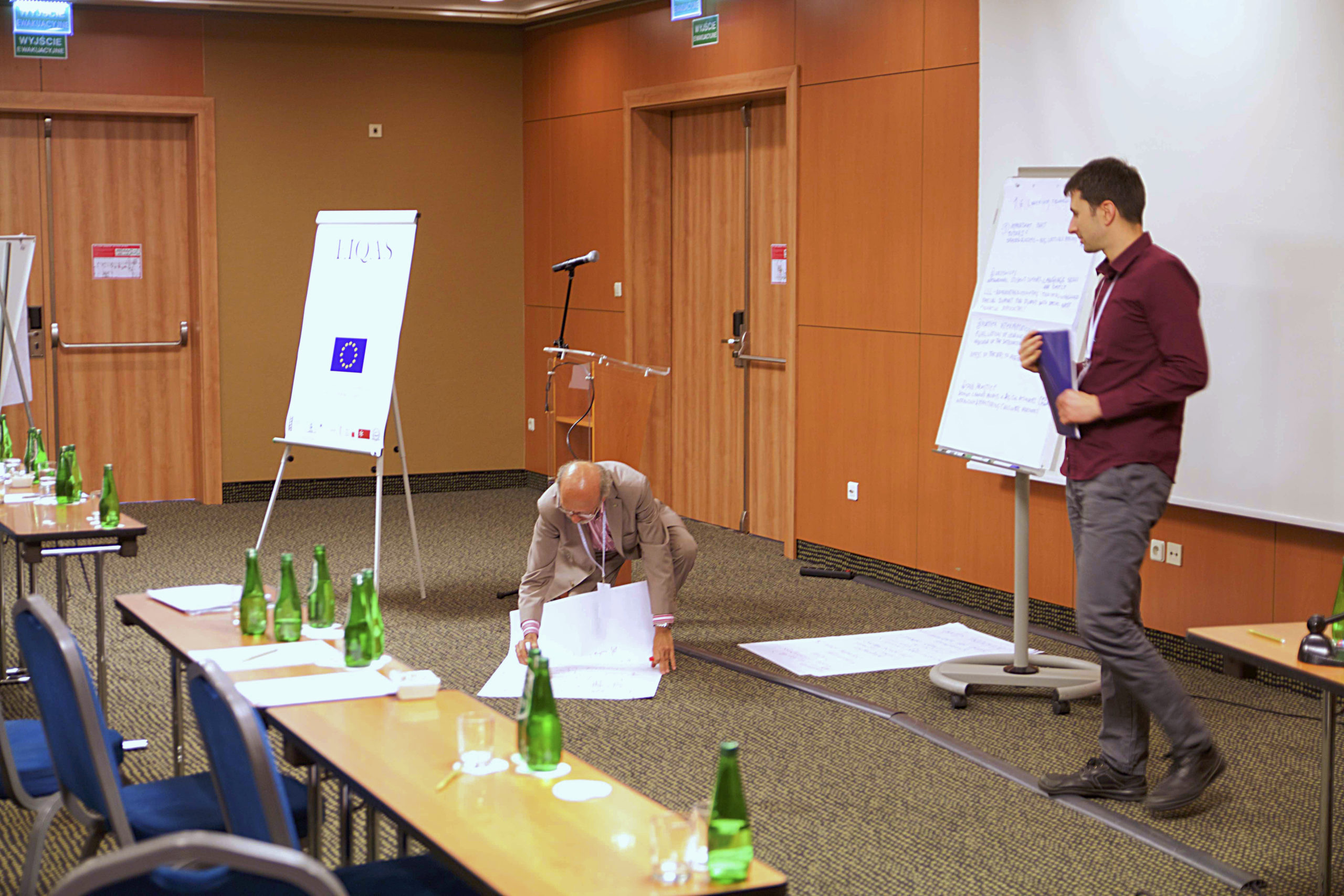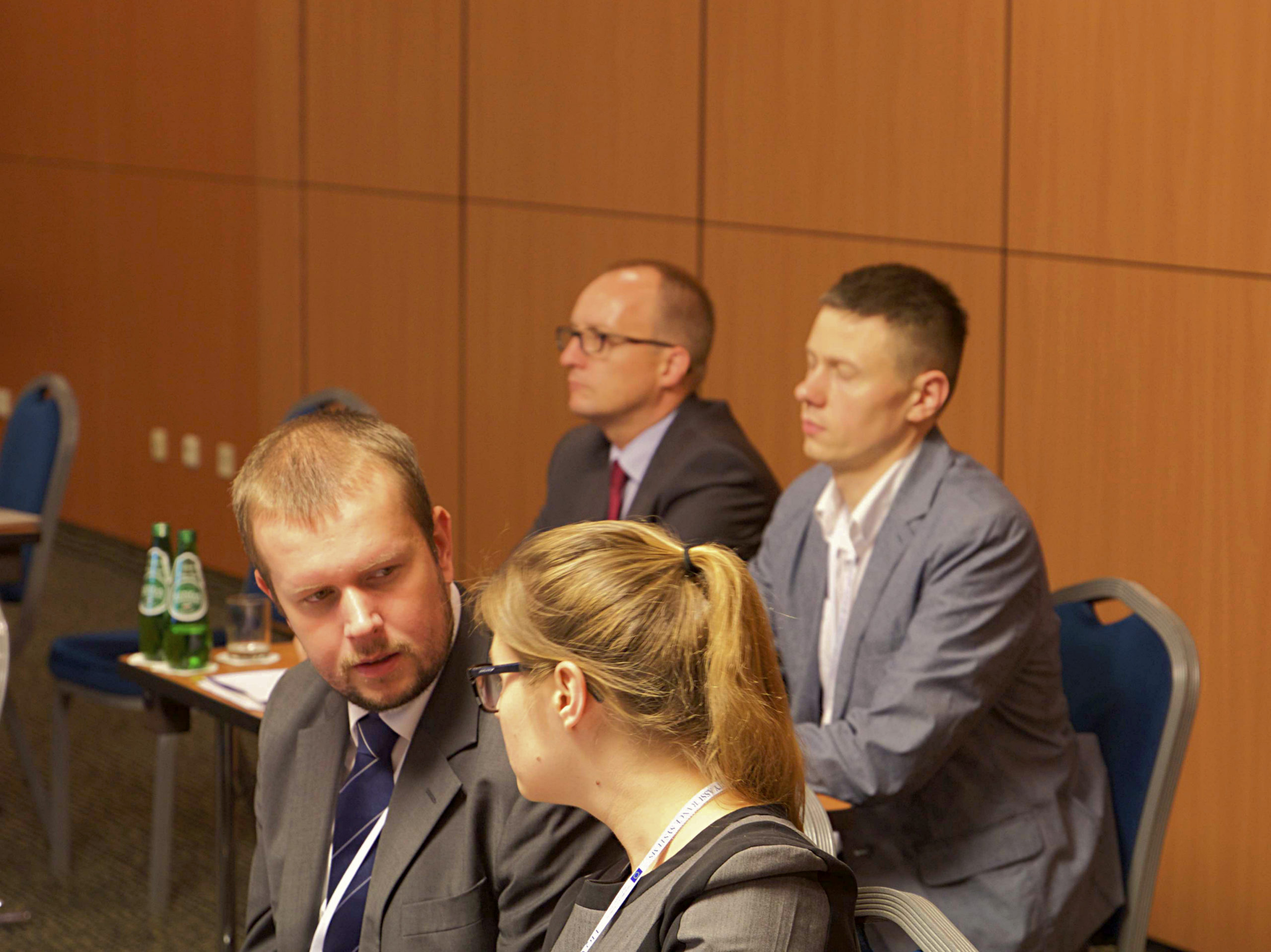Training Event 1 Warsaw
26 – 30 June 2015General description
SEMINAR ON IQA & ESG PART 1
The five-day Seminar on IQA and the ESG will be held in Warsaw in 26-30 June 2015. Its purpose is to discuss the partner Agencies’ methodologies for the assessment of IQA, to discuss and, where possible, arrive at a common understanding of Part 1 of the ESG, and to identify key issues and features of best and innovative practice in IQA. It will be attended by 50 participants /24 individuals from project partners and 26 representatives of Polish Higher Education Institutions/
READ MORE
Training Event 1 (Seminar on IQA and the ESG) is a key activity with regard to the achievement of the project objectives. The EIQAS project has two objectives. One of them is to increase the capacity of HEIs in the participating countries to develop IQA and build a quality culture by enhancing their awareness and understanding of Part 1 of the ESG and identifying, developing and disseminating good innovative practice in internal quality assurance. The training seminar will include presentations on Part 1 of the ESG and IQA systems, and discussion workshops in smaller groups on how each of Part 1 ESG can be interpreted and on good practice in IQA. The Seminar will be the only project event for the Agencies and HEIs specifically devoted to in-depth discussions on the ESG and IQA. Ideas and suggestions collected there will also provide the most significant input to the Guide to IQA promoting the ESG. While a proposed methodology for the identification of good practice examples has been developed before the seminar, modifications can still be made after the seminar to take into account suggestions made during workshop discussions. Further, although examples of good practice in IQA to be disseminated through the Guide will be selected mainly on the basis of the evidence already collected by the Agencies through their EQA processes and the academic project partners’ knowledge of institutional approaches, other examples may be discussed during seminar and then included in the Guide.
As the EIQAS project as a whole is financed from the Polish Erasmus+ budget the Seminar will be held in Poland and the seminar will be attended by a larger number of representatives of Polish HEIs. This will increase the impact on Polish higher education in terms of enhancing the understanding of the ESG and the awareness of good practice arrangements in IQA, as envisaged in the project objectives.
The second objective of EIQAS is to increase the capacity of the participating QA agencies in EQA by comparing their methodologies for the assessment of internal quality assurance and exchanging and developing good practice in IQA assessment. A reference framework for a comparative analysis of IQA assessment methodologies has been developed before the seminar and on the online discussion/ meeting. However, a discussion workshop during the seminar will be the only opportunity for a face-to-face discussion and an in-depth comparative analysis of the Agencies’ methodologies. Conclusions will provide the basis for a comparative report on IQA assessment methodologies to be produced after the seminar. Further, in broader terms, as the seminar is planned for five days, it will give the Agencies which have not worked closely together yet a good opportunity to get to know each other better with a view to initiating exchange of experts and concluding bilateral cooperation or recognition agreements in the future.
Programme
| 11.00 – 12.00 p.m. | Preparatory meeting of Project Management Group | |
| 12.00 – 12.30 p.m. |
Welcome speech Overview of EIQAS project |
Danuta Strahl PKA vice President Project Coordinator Izabela Kwiatkowska |
| 12.30-2 p.m. | Presentation of Part 1 ESG – after Yerevan communique and discussion |
Tove Blytt Holment EIQAS Advisory Board ENQA Board Member |
| 2 – 2.30 p.m. | Presentations by students on key IQA issues from their perspective |
Blazhe Todorovski ESU representative |
| 2.30 – 3.00 p.m | Lunch Hotel Mercure Restaurant | |
| 3.00-5.00 p.m. | Presentation of findings from online survey on IQA and the ESG – Country reports/Cross country report |
Report authors from PKA, NEAA, SQAA, A3ES: Izabela Kwiatkowska Todor Shopov Klemen Subic Madalena Fonseca Mieczysław W. Socha |
|
10.00 a.m. – 1 p.m. /after 45 minutes session change of participants/ 11.45 p.m. Coffee Break |
3 parallel workshops in smaller groups (how each of Part 1 ESG is interpreted by HEIs, which aspects are unclear and how they are understood in HEIs’ practice, where more detailed guidelines would be particularly helpful – qualitative interview) ESG standards analysed: |
Moderators: |
|
1.1. Policy for quality assurance and 1.10 Cyclical external quality assurance |
Mieczysław W. Socha and Izabela Kwiatkowska; |
|
|
1.2. Design and approval of programmes and 1.9 On-going and periodic review of programmes |
Madalena Fonseca and Veronika Piccinini |
|
|
1.3. Student centred learning, teaching and assessment and 1.4. Student admission, progression, recognition and certification |
Vanja Perovsek and Todor Shopov |
|
|
1.00 – 2.00 p.m. |
Findings from workshops, discussion |
Moderators reports from morning sessions |
|
2.00 – 3.00 p.m. |
Lunch Hotel Mercure Restaurant |
|
|
3.00 – 4.30 p.m. /after 45 minutes session change of participants/ |
2 parallel workshops in smaller groups (how each of Part 1 ESG is interpreted by HEIs, which aspects are unclear and how they are understood in HEIs’ practice, where more detailed guidelines would be particularly helpful – qualitative interview) ESG standards analysed: |
Moderators: |
|
1.7 Information management and 1.8 Public information |
Klemen Subic and Maciej Markowski |
|
|
1.5 Teaching staff and 1.6 Learning resources and student support |
Andrzej Kraśniewski Ivan Leban, |
|
|
4.30-5.00 p.m. |
Findings from workshops, discussion |
Moderators reports from afternoon sessions |
|
8. 00 p.m. |
Dinner Smaki Warszawy Restaurant |
|
|
09.30.-10.00 a.m. |
Presentation of the methodology for the identification of IQA good practice agreed by the Partnership, followed by discussion on the definition of good practice and methodology for the identification of good practice |
WG5 leader: NEAA Todor Shopov |
|
|
10.00-1.30 p.m. |
Presentations on IQA systems and good practices given by HEIs Polytechnic Institute of Viana do Castelo University of Sofia University of Ljubljana University of Minho WSB Schools of Banking |
Ana Sofia Rodrigues Anastas Gerjikov Vanja Perovsek Isabel Santos Anna Trzuskawska |
|
|
1.30-2.00 p.m. |
Lunch Hotel Mercure Restaurant |
||
|
2.00-4.30 p.m. |
Presentations on IQA systems and good practices given by HEIs University of Coimbra University of Madeira University of Social Sciences Warsaw/Lodz/Cracow/London University of Nova Gorica University of Beira Interior |
Madelana Alarcão Custodia Drumond Justyna Kopańska Veronika Piccinini Isabel Cunha |
|
|
10.30 a.m. – 1.00 p.m. |
A discussion workshop to compare quality assurance agencies methodologies for the assessment of IQA according to an agreed reference framework and to identify good and transferable practice: a presentation of each Agency’s methodology followed by a discussion
|
Facilitator WG3 leader: SQAA Jernej Sirok Presentations: PKA, NEAA, SQAA, A3ES
|
|
1.00 – 2.00 p.m |
Lunch Żurawina Restaurant |
|
|
2.00 p.m. – 3.30 p.m. |
The workshop for the Agencies cont.: summary of the discussion on the Agencies’ approaches to the assessment of IQA and the identification of good and innovative practice which may be usefully transferred to other countries within and outside of the Partnership
|
Facilitator WG 3 leader: SQAA Jernej Sirok
|
|
3.30 – 4.00 p.m. |
ESG and IQA from teaching staff perspective |
Maria João Rosa |
|
10.00-12.00 a.m. |
Wrap-up discussion on the interpretation of the ESG and good practice within the Partnership; summary conclusions from each workshop by partners. Final discussion on the structure of Guide to IQA.
|
Facilitator: PKA representative
|
|
12.00 – 1.00 p.m |
Lunch Żurawina Restaurant |
|
Gallery
Presentations
EIQAS ENHANCING INTERNAL QUALITY ASSURANCE SYSTEMS ERASMUS PLUS PROJECT 2014-2016
Izabela Kwiatkowska-Sujka
Standards and Guidelines for Quality Assurance in the European Higher Education Area (ESG for the EHEA)
Tove Blytt Holmen
Key Internal Quality Assurance Issues
Students’ Perspective
Blazhe Todorovski
Cross-country survey results on IQA and ESG
Ivan Leban
Country Report: Portugal
Findings from the questionnaire survey on Part I of the European Standards and Guidelines for Quality Assurance and Internal Quality Assurance Systems
Madalena Fonseca
Poland. Conclusions
Isabela kwiatkowska – Sujka, Mieczysław W. Socha
COUNTRY REPORT: SLOVENIA Findings from the questionnaire survey on Part I of the European Standards and Guidelines for Quality Assurance and Internal Quality Assurance Systems
Klemen Šubic
EIQAS
Training Event 1
Warsaw, Poland
Todor Shopov
Internal Quality Assurance System commitment to quality
Internal Quality Assurance at Sofia University
prof. Anastas Gerdjikov
Quality Assurance and Development System at the University of Ljubljana
Vanja Perovšek
A Comprehensive Internal Quality Assurance System At University Of Minho
Isabel M. Santos, Graciete Dias
QUALITY ASSURANCE SYSTEM WSB w Toruniu (Toruń School of Banking)
Dr Anna Trzuskawska-Grzesińska
The Management System of the University of Coimbra
INTERNAL QUALITY ASSURANCE SYSTEM Madeira UniversiTy (UMa), Portugal
Custódia Drumond
IQA Systems and Good Practices in University
of Social Sciences in Lodz
Justyna Kopańska, Justyna Lotka
Presentation of Internal Quality Assurance System: University of Nova Gorica, Slovenia
Veronika Piccinini
Building Quality Assurance at UBI
Isabel Cunha
REFERENCE FRAMEWORK FOR COMPARATIVE ANALYSIS OF AGENCIES‘ IQA ASSESSMENT METHODOLOGIES
mag. Jernej Širok
SQAA PRESENTATION OF IQA ASSESSMENT METHODOLOGY
mag. Jernej Širok
Contribution to
Reference framework for comparative analysis
of Agencies' IQA assessment methodologies (EIQAS Project WG3)
Madalena Fonseca
PKA PRESENTATION OF IQA ASSESSMENT METHODOLOGY
ESG and IQA
from Portuguese Academics’ Perspective
Maria João Rosa
